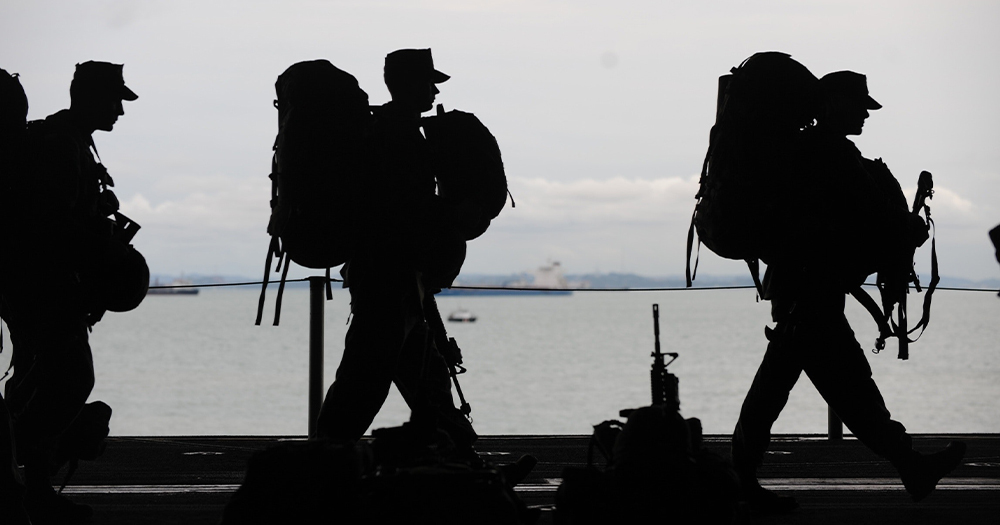Why the repeal of the trans military ban is facing mixed reactions from the queer community
While the repeal was a step forward for equality, many community members are taking this moment to speak out against US imperialism.
Trump’s ban on trans people in the military undermined the right to equality for transgender Americans and perpetuated harmful stigma against the community. For many LGBTQ+ people, Biden’s repeal of the trans military ban during his first week in office has signified the end of Trump-era antagonism and offered a beacon of hope for the future. However, some community members are less eager to celebrate the change.
Biden’s reversal of the military ban is clearly following human rights principles, however, the same cannot be said for the US military itself. With a history of imperialism and recorded cases of human rights abuses, the association of the queer rights movement with this institution is something that many are not willing to accept. As put by writer Polly Anna Rocha in a now-viral tweet: “As a trans person, I would like to ban the military”
as a trans person, i would like to ban the military. ☝???
— Polly Anna Rocha ?️⚧️ (@JazzCochina) January 25, 2021
When looking at the discourse surrounding Biden’s policy change, it is clear to see why some trans people are choosing now to express their opposition to the military. Media focus has often been pulled away from the achievement of basic human rights and towards a celebration of militarism. Biden’s own statements on the repeal seemed to emphasize military power above equality; “allowing all qualified Americans to serve their country in uniform is better for the military and better for the country because an inclusive force is a more effective force”.
In this context, trans inclusion is being framed as a tool to strengthen the military-industrial complex, rather than an end in and of itself. Trans activist, Isa Noyola, spoke out about this issue on Twitter, arguing that we must create a world “that does not relate and confuse our right to exist as trans ppl with the state exploiting our bodies for war and destruction.” Noyola also argued that the LGBTQ+ community must look beyond basic equality and towards real liberation.
4/5 We have so much work to do,
to imagine and create a world that does not relate and confuse our right to exist as trans ppl with the state exploiting our bodies for war and destruction. ?️⚧️#TransMilitaryBan— Isa ? ?️⚧️ (@muxerisa) January 25, 2021
Although many see militarism as conflicting with the queer rights movement, the army is undeniably an important source of employment for trans people. In fact, transgender people are twice as likely as cisgender people to serve in the US military. This is not however because the military is a queer-friendly space – far from it. The US military has a track record of discrimination and harassment against members of marginalised groups, including queer people. In fact, a 2020 study found that nearly 60% of LGBTQ+ service people did not feel comfortable being out at work.
So why then is the US military widely accepted as being the largest employer of transgender Americans? According to former soldier and trans woman, Paige Kreisman, young trans people are coerced into enlisting due to poverty and abusive home lives. Speaking on the podcast Gender Reveal last year, she argued that the military recruits “by preying on marginalised and disadvantaged young people”. Kreisman believes that the trans liberation movement and anti-militarism go hand in hand, but explained how joining the army is the only option for some trans people.
Kreisman argues that when trans people are pushed into military service, they are forced to victimise marginalised people abroad and further perpetuate oppressive power structures. This sentiment was echoed by J Mase III, trans activist and educator, who made a statement on Instagram last week in response to the repeal of the trans military ban. He claimed that inclusion in the military makes trans people complicit in the destruction of other targeted trans communities around the globe.
Though the trans military ban was unjustifiable, Biden’s recent policy change is not necessarily a milestone for trans-liberation. Trans people are still forced into the military due to lack of opportunity, trans servicepeople still experience discrimination and fear in their work and the US military still terrorises vulnerable groups throughout the world. For as long as these issues remain, equality on paper will never be enough. If Biden’s presidency is to make real ground for trans people, then issues such as access to employment, healthcare and secure housing need to be addressed.
© 2021 GCN (Gay Community News). All rights reserved.
Support GCN
GCN is a free, vital resource for Ireland’s LGBTQ+ community since 1988.
GCN is a trading name of National LGBT Federation CLG, a registered charity - Charity Number: 20034580.
GCN relies on the generous support of the community and allies to sustain the crucial work that we do. Producing GCN is costly, and, in an industry which has been hugely impacted by rising costs, we need your support to help sustain and grow this vital resource.
Supporting GCN for as little as €1.99 per month will help us continue our work as Ireland’s free, independent LGBTQ+ media.
Hey there!
Enjoying GCN?
You have read all free 5 articles on GCN this month.
If you are enjoying GCN, how about sign up for free to access all articles? You can also log in from here if you already have an account.
